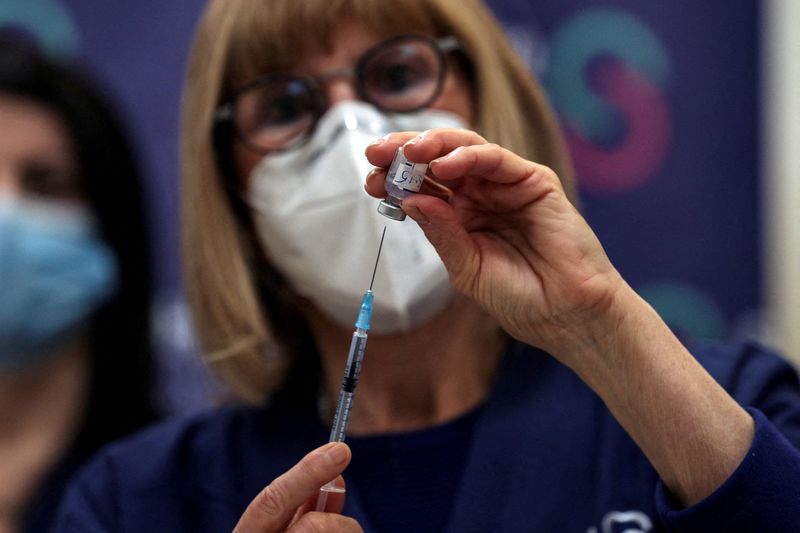By Julie Steenhuysen and Maayan Lubell
CHICAGO (Reuters) - Some nations are already looking to a fourth vaccine dose to help contend with a huge Omicron-driven spike in COVID-19 cases, but early signs suggest repeat vaccination may be a hard sell as beleaguered populations enter their third pandemic year.
Uptake of the first round of boosters in recent months - a third shot for most - has lagged initial vaccinations.
Disease experts say that rapidly shifting public health messaging in the face of a quickly-mutating virus has bred confusion and mistrust over the benefit of boosters.
The Omicron variant of the coronavirus has more than 30 mutations on the spike protein - the target of most current COVID-19 vaccines. These changes have increased Omicron's transmissibility, and allowed the virus to evade protection from symptomatic disease induced by vaccines and prior infection. Yet vaccines remain the critical tool in preventing severe disease and death, experts say.
Lab studies suggest that a third shot of vaccines from Pfizer (NYSE:PFE) Inc/BioNTech SE or Moderna (NASDAQ:MRNA) Inc, already offered as a booster in many countries, can restore much of that lost protection.
But UK government data released in December found that increased antibody protection against Omicron from the booster wanes after 10 weeks, raising questions about whether additional shots would be needed in short order.
Based on its lab studies, Pfizer chief scientist Mikael Dolsten told CBS News in early December that it is "very likely" a fourth dose of the vaccine would be needed within months if Omicron persists as the dominant version of coronavirus. Israel is already administering a fourth dose of the Pfizer/BioNTech shot to people over the age of 60, immunocompromised patients and healthcare workers to protect them against an Omicron surge.
Government officials there have cited early evidence that the extra shot was safe and provoked a five-fold boost in antibodies that can protect against infection and severe disease.
In the United States, White House medical adviser Dr. Anthony Fauci in late December said it was "conceivable" that an additional booster would be needed, but that the decision on further doses will be based on not yet available information on the durability of existing booster shots.
Immunocompromised individuals in the United States are offered three doses of vaccine as part of their initial series of shots, and a single booster shot six months later. Health officials in the Netherlands, UK and Germany have also floated the notion of the need for additional booster shots, while French officials have said they will not make a decision until mid-February or March, when more data are available. DO I NEED THIS? Yasmin Maor, a member of the Israeli advisory panel that recommended a fourth round of shots for those most at risk from COVID, told a news conference last month that people may need to be prepared to receive multiple shots a year to address a pandemic of this magnitude.
For the wider public, that message may not be welcome, even among those willing to be vaccinated in the first round of inoculations. Recent health data shows that 9% of the Israeli population has "invalid" vaccine status, meaning they took their second shot but not a booster.
In Russia, data are sparse, but at the last update on Dec. 12, Russian health minister Mikhail Murashko said 10 million people were boosted, compared with 73 million Russians - or about half the population - who received an initial round of shots.
In the United States, 62% of the population, or 207 million people, were considered fully vaccinated, as of Jan. 7. A little more than a third of that number - 73 million - has received a booster dose. Some experts have suggested a booster should be included in a new definition of fully vaccinated.
Dr. Angela Rasmussen, a virologist at the University of Saskatchewan in Canada, said in the United States boosters were portrayed as the way the country exits the pandemic. But Omicron's ability to infect many people who have received a booster dose - albeit typically with milder illness - has changed that narrative.
"There's tons and tons and tons of anecdotal stories out there about boosted people getting Omicron, and I think a lot of people are saying, "What's the rush? Why do I even need to do this?," Rasmussen said.

The reason, she said, is because although they may not prevent all infections, booster shots will keep people from winding up in an intensive care unit. Part of the frustration stems from the nature of the ever-mutating virus itself, which has forced frequent policy updates on everything from mask-wearing to quarantine requirements that have left people confused and distrustful.
Said Jason Gallagher, an infectious disease expert at Temple University's School of Pharmacy: "People are looking for a degree of certainty that can't exist in a situation that's constantly changing."